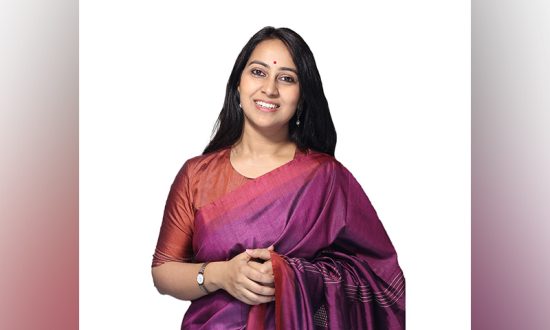Ms Priyal Bhardwaj, Vice President, BJP Mahila Morcha. She is an Indian political activist, fashion designer and founder of Sangini Saheli – an organization that believes in providing equal opportunity for overall growth and development to all children, women, the disabled and less privileged. Born and raised in Bhopal, Priyal graduated with B.Tech in CSE from RGPV (Bhopal) and Masters’s in Fashion from NIFT (Hyderabad). She has been actively working on women’s empowerment projects to create better opportunities and equal avenues for everyone. In addition, she has actively been educating and creating awareness around topics including but not limited to gender equality, menstrual hygiene, financial independence, education, legal rights and more. Since 2014, Priyal has led numerous initiatives, including volunteering at blood and eye camps, conducting self-defence training for women and girls, organizing campaigns for menstrual health and awareness, installing sanitary vending machines, distributing sanitary pads to those in need from Jammu Kashmir to West Bengal, and running a school and educating underprivileged children through the project “Ujjwal Bhawishya” to highlight a few. She is also actively involved in the Rehabilitation of the Kishori Raman Inter College High School in Meerut under Brij Shiksha Kaya Kalp.
For 2022, the United Nation’s theme is “Gender equality today for a sustainable tomorrow”, which aims to recognise women working to build a more sustainable future. The campaign aimed to identify and celebrate the contributions of women and girls worldwide as they lead and take charge of climate change adaptation, mitigation, and response to build a more sustainable future for all. India, too, applauded women as critical contributors to the country’s existing and future economic growth and social development.
Since 2014, the Union Government has made numerous efforts to address women’s issues to take a more comprehensive picture. As a result, women’s participation in the new India’s growth cycle is steadily expanding. However, the onset of the pandemic, women’s perceptions of opportunities, and the gender gap further stifle career advancement for working women in India. However, the growth is slow. This is worth mentioning as we are fighting archaic points of view and progress on women is a multifaceted challenge entrenched in our culture and societal attitudes.
Currently, women in India account for almost 45 per cent of our workforce, which is enormous. Strong female participation in boardrooms and the middle and junior workforce is critical for all businesses to build a sustainable future and promote business excellence. Over the past decade, India has witnessed a significant change. We have noticed an attitudinal shift towards women’s equality and emancipation in society. Several organisations in the country have adopted progressive practices in bridging the gender pay equity and inclusion gap by conducting sensitisation workshops for recruiters and hiring managers.
To enhance female labour-force participation, companies must rethink their diversity procedures and provide greater flexibility to caregivers. Reduced and flexible work hours, more sabbaticals, and additional opportunities to upskill and learn are essential options that can assist firms in attracting, hiring, and retaining more female talent.
Numerous businesses have evolved their HR practices. They have adopted progressive measures in equal pay, proactive safety resolutions for women, campus diversity hiring, and career and professional development for women. India’s banking sector has seen this change, with women reaching the top echelons of the industry. In addition, organisations encouraged and targeted high potential women leadership succession candidates. Such efforts have increased the representation of women in leadership roles In India, fuelling the commitment to bridging the gender pay equity and inclusion gap.
Women’s empowerment is becoming increasingly crucial in countries worldwide, including India. The Indian government has also acknowledged women’s difficulties and their economic contribution to the country. Some of the relevant women empowerment programmes accessible in India are listed below.
Mahila E-haat is a direct internet marketing platform developed by the Ministry of Women and Child Development to assist women entrepreneurs, Self-Help Groups (SHGs), and Non-Governmental Organisations (NGOs) in showcasing their products and services. This initiative is part of the effort anointed “Digital India.” Women can register at www.mahilaehaat-rmk.gov.in and use technology to showcase their work to a larger market.
(STEP) The Support to Training and Employment Programme for Women aims to offer women skills that increase their employability, competencies and skills which allow them to become self-employed/ entrepreneurs. A specific project may last up to 5 years, depending on the nature, type of activities, and the number of people involved. Industries included are Horticulture, Handlooms, Handicrafts, Food Processing, Agriculture, Tailoring, Stitching, Embroidery, Computer & IT-enabled services, and soft skills and workplace abilities such as soft skills spoken English, Travel & Tourism, Hospitality, Gems & Jewellery amongst others.
Working Women Hostel Scheme aims to enhance the availability of safe and convenient accommodation for working women and day-care for their children, wherever viable and job possibilities exist for women. The plan includes funds to construct new hostel buildings, expand existing hostel buildings, and make hostel buildings in rented areas. Working women’s hostel projects funded by this plan will be available to all working women, regardless of caste, religion, marital status, or other considerations, as long as they match the scheme’s standards.
As a country, India is working towards helping women reach the pinnacle of success with several schemes for women empowerment and welfare to uplift their lives to actualising gender equality. With an increasing number of women joining the workforce and becoming entrepreneurs, the future looks bright. However, conversations and awareness programmes on women’s equality and safety must continue as a standard practice. Moreover, India has the youngest population in the world. Thus, embracing progressive social ideologies that view women in equal light needs to be a crucial part of an ongoing dialogue on where India wishes to see women contribute to the country’s economic and social growth in the future.






